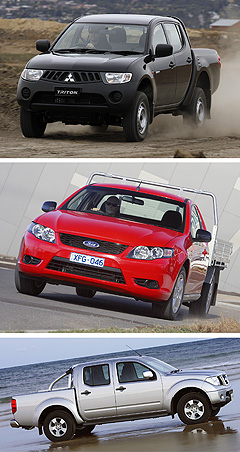Make / Model Search
News - VFACTS - Sales 2009 - MayUtes carry vehicle market hopesOn the up: The Holden Ute and its rival, the Ford Falcon Ute, gained sales traction last month as incentives kicked in. Tax incentives spur locally-made ute sales into positive territory3 Jun 2009 INCREASED demand for workhorse utes has helped to steady the wobbly Australian new-vehicle market, thanks in large part to federal government tax incentives for business buyers and end-of-financial-year marketing activity. The Big Two locally-made utes, the Holden Ute and Ford Falcon Ute, both recorded solid increases in May sales compared with the same month last year, according to official VFACTS figures released today by the Federal Chamber of Automotive Industries. While the market still declined 14.9 per cent in May, to 75,441 units, the rate of descent was less steep than the 20 per cent-plus falls seen so far this year. The figures have helped to buoy the industry, which is hoping the May result is the harbinger of better things as the economy gains strength. Hyundai was the big winner last month, with its i30 small car helping the Korean importer to a 32.4 per cent gain in volume over the same month last year. Hyundai was the only top 10 company to grow sales, thanks to the massive 155 per cent jump in i30 volume, to 1959 units, which helped to entrench Hyundai in fifth place on the sales table with a 6.3 per cent share and a record May sales tally of 5178 cars. At the other end of the scale, Chrysler sales were down 46.3 per cent as the bad news of the parent company’s travails in the US filtered down to the Australian market.  From top: Mitsubishi Triton, Ford Falcon Ute, Nissan Navara. From top: Mitsubishi Triton, Ford Falcon Ute, Nissan Navara.Toyota remains Australia’s number one car-maker, but it suffered worst of the Australian manufacturers last month, down 25.3 per cent compared with May 2008. Every model in the 17-model Toyota range revealed a decline, with volumes of the mass-selling Corolla and Camry both falling 29 per cent. Compared with May last year, Toyota sold 5273 fewer vehicles for the month, down to 15,481 units, to end up with an overall market share of 20.5 per cent – down almost three percentage points on its share of a year ago. Year to date, its share is 20.7 per cent. However, Toyota still holds a comfortable lead over second-placed Holden, which recorded 9177 sales in May, representing a 17.5 per cent decline year-on-year. Holden’s share eased to 12.2 per cent – down from 12.5 per cent this time last year. A bright spot for Holden was its light-truck performance, with the Holden Ute taking full advantage of the government tax incentives to record a 9.8 per cent sales volume increase, to 1221 units. The Holden Ute outshone the Ford’s Falcon Ute in volume, but the Ford’s 1050 sales represented a bigger increase, up 14.8 per cent on May last year. Gains by imported one-tonner light trucks were harder to find, with the Mitsubishi Triton, Holden Colorado 4x4 and Nissan Navara among those to edge into positive territory. Overall, light truck sales were down 8.4 per cent – a little more than half the fall of the overall market. Despite a 12.5 per cent fall in sales – to 8440 units – Ford managed to increase its share by a modest 0.3 per cent, to 11.2 per cent. Alarmingly for rival Holden, that means Ford is now just one percentage point behind. However, Holden will be looking forward to launching its new mass-selling small car, the Cruze, to rectify its small-car draught caused by the withdrawal of the Astra and Viva. One of the big shining lights for Ford was its new Fiesta light car, up 31 per cent month on month. Among the Japanese importers, Mazda held up well again in May, with sales down a respectable 7.3 per cent to 6052 units and a market share of eight per cent. Mazda's new Mazda3 topped the small-car sales ranks for the third time this year, clocking up 3038 units against the Toyota Corolla's 2583. Mazda3s sales are up 17.7 per cent this year. Nissan sales slipped 9.7 per cent, to 4582 units (6.1 per cent share). But Mitsubishi and Honda both got the staggers, with Adelaide-based Mitsubishi taking a 23.6 per cent hit – down to 3921 units, to a 5.2 per cent share – while Honda fared even worse, down 29.2 per cent to 3189 units (4.2 per cent). German imports Audi (+14.4 per cent) and Mercedes-Benz (+8.1 per cent) both made healthy gains, but rival BMW slipped 24.6 per cent, sliding behind Benz – 1171 units to 1832. |
Click to shareVFACTS articlesResearch VFACTS Motor industry news |









Facebook Twitter Instagram